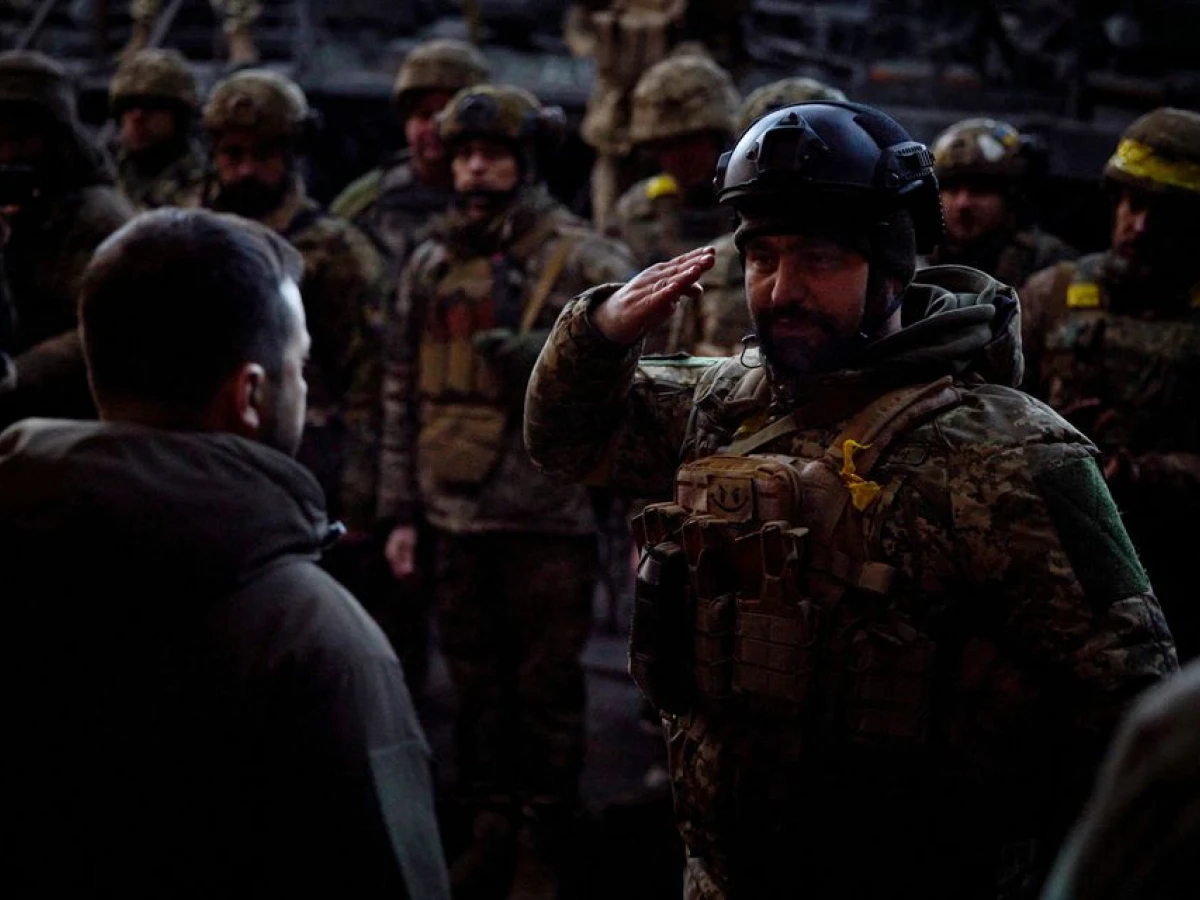
Zelenskiy visits frontline Ukraine city where Russian army faltering
The conflict in Ukraine has killed tens of thousands of people, driven millions from their homes and reduced cities to ruins.
KYIV, Dec 20 (Reuters) - Ukrainian President Volodymyr Zelenskiy made a surprise trip to troops in the battered eastern frontline city of Bakhmut on Tuesday, underlining Russia's stuttering but persistent attempts to capture it.
In contrast, Russian President Vladimir Putin awarded medals inside the comfort of the Kremlin to the Russian-appointed leaders of four regions of Ukraine that Moscow has claimed to have annexed since invading its neighbour on Feb. 24.
Zelenskiy, in his Tuesday night video address, referred to his trip to "Fortress Bakhmut" in Donetsk, one of the provinces Russia claimed in September but most countries reject as illegal occupation.
He said he passed through several towns in Donetsk region including Sloviansk, Kramatorsk and Kostyantynivka, which have long been cited as possible Russian targets.
"Please support our Bakhmut - tattered but unconquered - and its defenders," Zelenskiy said in his address.
The most destructive fighting in recent weeks has taken place around Bakhmut, where Zelenskiy, dressed in combat khaki, handed out medals to soldiers in a tumble-down industrial complex to loud applause, video released by his office showed.
With the boom of artillery audible in the distance, he urged them to keep up their spirits as the battle for Bakhmut, one that has come to symbolise the grinding brutality of the war, enters its fifth month.
"The East is holding out because Bakhmut is fighting. In fierce battles and at the cost of many lives, freedom is being defended here for all of us," Zelenskiy wrote on the Telegram messaging app.
Earlier, he repeated calls to the West for more weaponry including air defence systems after Russian drones hit energy targets in a third air strike on power facilities in six days.
A U.S. government funding bill in the Senate included $44.9 billion in emergency assistance to Ukraine and NATO allies. The money would be used for military training, equipment, logistics and intelligence support, as well as for replenishing U.S. equipment sent to the government in Kyiv.
The World Bank on Tuesday said it had approved an additional financing package totalling $610 million to address urgent relief and recovery needs in Ukraine.
PUTIN ACKNOWLEDGES DIFFICULTIES
Putin told Russia's security services they needed to significantly improve their work, one of his clearest public admissions yet that the invasion was not going to plan.
He acknowledged problems for Russian forces in parts of Ukraine.
"The situation in the Donetsk and Luhansk People's Republics, in the Kherson and Zaporizhzhia regions is extremely difficult," Putin said in a video address to security workers translated by Reuters.
Putin's address followed a visit to close ally Belarus that stoked fears, dismissed by the Kremlin, that Russia's fellow former Soviet republic could help it open a new invasion front against Ukraine, where fighting has been concentrated hundreds of miles (km) away in the east and south of the country.
In another move on the 300th day of his invasion, Putin ordered the FSB, the country's primary security agency, to step up surveillance of Russian society and borders to combat the "emergence of new threats" from abroad and traitors at home.
Western countries have imposed unprecedented sanctions on Russia and the rouble slumped to a more than seven-month low against the dollar on Tuesday after the European Union agreed to cap prices of natural gas, a major Russian export.
In Washington, a senior U.S. State Department official told reporters there were conflicting views in Russia on what the next steps in Ukraine should be, with some seeking new offensives and others doubting Russia's capacity to wage them.
ATTACKS ON POWER GRID
Russian air attacks on the Ukrainian power grid, which Kyiv says are aimed at civilians to break their will to resist, have repeatedly cut power and water supplies amid subzero winter cold.
Prime Minister Denys Shmyhal said Ukrainians should prepare for new Russian attacks on energy infrastructure because Moscow wanted them to spend Christmas and New Year in darkness.
Electricity supplier YASNO, which covers the area of the capital Kyiv, offered no immediate respite for residents hoping at least for planned outages.
"We are not even counting on a return to scheduled disconnections," Sergey Kovalenko, YASNO chief executive, said in a Facebook post late on Tuesday.
The conflict in Ukraine has killed tens of thousands of people, driven millions from their homes and reduced cities to ruins, with no end in sight.
Russian forces continued training tank and artillery fire on Ukrainian positions in 24 settlements in the vicinity of Bakhmut and nearby Avdiivka on Tuesday, and again shelled northeastern and southern areas recently recaptured by Ukrainian forces, Ukraine's army General Staff said in its evening update.
Ukrainian aircraft carried out 10 strikes on concentrations of Russian ground forces and equipment and further strikes on anti-aircraft emplacements, an ammunition depot and three command posts, it said, without providing locations.
Reuters could not independently verify the battlefield accounts of either side.




